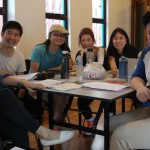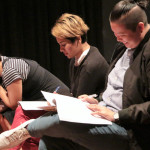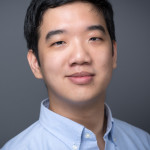In 2011, The Finger Players (TFP) launched a development programme for playwrights and directors called Watch This Space. It is spearheaded by playwright-director Chong Tze Chien, who felt that there were not enough platforms supporting new voices in the Singapore theatre scene at the time.
“I think as a theatre company, it is our responsibility to inject some form of training programme to enrich the ecosystem, because the reason that we are here today is also because of the generosity of our predecessors. I wouldn’t be here without Haresh Sharma and other theatre companies opening their door to me. I think I am just passing the baton,” says Tze Chien. “Because how else do you grow the scene if you don’t have writers, directors, and actors? You need those before you can grow an audience.”
Watch This Space runs an open call for playwrights and directors on alternating years, and past participants include Zelda Tatiana Ng, Tan Liting, and Thong Pei Qin for the Directors Series, and Ng Yi-Sheng, Lucas Ho, and Ellison Tan Yuyang for the Playwrights Series. The two latest playwrights to be selected for the programme are Euginia Tan and Jo Tan, who began their mentorship with Tze Chien in June 2017. A closed-door dramatised read for their works will be held at Centre 42 this month, and Tze Chien will eventually select one of those scripts to be developed into a full production to be staged under TFP’s main season in 2019. Euginia’s play is called The Man in the Coffin, while Jo’s is called Forked.
We catch up with the pair to find out more about their journey so far.
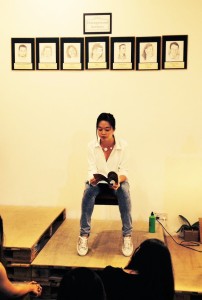
Euginia Tan’s play, The Man in the Coffin, is inspired by the story of her aunt.
Let’s start from the beginning. How did the idea for your play come about?
Euginia Tan: The story is based off my aunt, my father’s youngest sister, who has been living in the United States as a nun for the Little Sisters of the Poor for at least two decades. I’ve visited her and lived with the nuns for a month or so each time. I’ve found that under the uniform and the universal idea of being devoted to a cause, they’re still very human and grapple with their individual relationships to the faith and how they feel about it in different phases of their lives.
I have a very special relationship with this aunt also because a lot of my relatives believe we look alike. I wondered how much of an impact her [leaving Singapore] had on the family as a whole, and that, coupled with her experiences living abroad for so many years, spurred me to write this play.
Jo Tan: I really wanted to join Huzir Sulaiman’s playwriting masterclass three years ago, and to be considered, you had to send over an idea for a play you wanted to write. I had just gotten back from a year-long acting course in Paris, and I started thinking about the multiple personalities I had there: Asian for my teachers and certain schoolmates who seemed partial to Eastern exotica, and extremely Western when performing my acting pieces and sometimes just to blend in. For specific situations, I would also adopt different languages and accents (I’m lucky enough to have learnt a few languages).
But then my mentor, Philippe Gaulier, asked me during a Shakespeare class, why do you put on a voice? Can you speak your own language? At that point, my other classmates had taken to doing their monologues in their mother tongue of Mandarin, Hokkien, Spanish, Japanese, Italian etc., and were able to unlock something deep and unaffected in their performances. But I realised that I had focused so much on being an adaptable chameleon that I didn’t know what my native language was anymore. I decided that since this was something that I had been thinking for a while about, it would be good, simple, straightforward material for a first play. Two years on, I’m still learning how wrong I was!
Why did you want to decide to apply for Watch This Space?
ET: [Writer Ng] Yi-Sheng told me about the open call, so I went for it! I’ve always appreciated the process of mentorships because it’s a really different learning experience. This is not my first mentorship and every mentor is different, so I’ve been fortunate to expand my vocabulary in the field depending on each mentor.
JT: In Huzir’s masterclass, all the participants helped read one another’s plays and people seemed to quite like China Wine (as Forked was then called). They encouraged me to keep working on it, and I was wondering about getting continuing guidance post-masterclass to develop the work further. Then The Finger Players (TFP) sent out the notice calling for play submissions for Watch This Space. I had just worked with the mentor in question, Chong Tze Chien, as an actor on his first musical Itsy, and I felt I really grew from the experience because he invested so heavily in the people working with him. Also, I’ve always been a great fan of his writing – PIE was one of the first few Singapore plays I read that I wasn’t actually performing in, and I loved it. And I’ve also loved every single TFP production I saw, since the weird and wonderful I’m Just A Piano Teacher (2006). So I didn’t have to think too hard about it.
Euginia, the open call for Watch This Space required pretty much a full-length script to be submitted. Is that the script that you ended up working on over the past few months? If so, what was the process like as you worked on it, and how has it developed?
ET: Yes, it was the same script that I submitted, but currently it’s probably version 92742319401570 of it.
It was hell and I begged Tze Chien several times to let me give it all up and start on a fresh script, but he would call me out on copping out. Which was true. So I stuck it out. I’d like to be polite and say it was a wonderful process but it was tiring, arduous and currently the subject header on each email I’ve sent over containing the edited draft is “I Hate Playwriting”.
I’ve retained the comedic elements of the script from when I first submitted it, but the comedy is different now. It’s comic because the truth is oftentimes funny and hence also a sad reality check about people and their idiosyncrasies. Ultimately, it is also a story about how people come together in times of grief. And for that I appreciate the time span of the mentorship, because I’ve needed a lot of time to let things sink in so as to write scenes that are relatable both for myself and a larger audience. I can’t convince an audience if I’m not convinced of the story myself first.
On the other hand, Jo, the work that you’re showcasing under Watch This Space has been through several iterations, from China Wine in Saga Seed’s Seed Incubator Readings to Forked at this year’s M1 Singapore Fringe Festival. What has it been like to work on the same piece with all these different platforms?
JT: The main difference is that I’m working with different people, which has been pretty fantastic because I get advice from very divergent artists and really try them all out on the floor, in front of an audience. What a luxury! For the Saga Seed’s Seed Incubator readings, Jean Tay would offer feedback while the director was Tan Liting, and for Fringe I asked Chen Yingxuan to come onboard as director, and Joel Tan to help me as dramaturg – he was the one who came up with the current title when we were all brainstorming over a WhatsApp group – while Tze Chien continued to mentor. Quite a lot of people were involved, because the script was accepted by both Fringe and Watch This Space at the same time.
I also asked some of the theatre-makers I knew, including Lucas Ho, Faith Ng and of course Huzir and Claire Wong to come see the full dress and offer comments. I tried to take what I could from all of them, and I feel really privileged. At the same time, Tze Chien tells me that I can be too accommodating, since I often try to agree with everyone and combine what can be irreconcilable points of view, and that I need to find my own voice in order to know what to take on and what to reject… and that it’s perfectly okay to reject dramaturgical advice. Even his. Still getting there!
Another big difference between Fringe and Watch this Space is that for Fringe I had co-actors, and now I do not. My co-actors were absolutely brilliant, and I’m very glad I got to work with Chang Ting Wei before she relocated back to Taiwan.
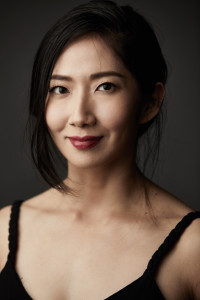
Jo Tan has been working on her play, Forked, for three years, even before she was selected for Watch This Space.
And can you tell us about the process that you/your script have gone through with Watch This Space so far?
JT: As someone who studied law and often works with corporate clients, I’ve always thought myself pretty articulate and analytical. But constantly being asked, what is this play about? What do you want to say? And not being able to give an answer below ten words – that’s forced me to confront the fact that I’m often a wobbly rambler. As for the play, it has transformed. The characters have been constantly changing and swapping countries and concerns and backgrounds, to better illustrate the issues rambled about. Some characters have been cut. The protagonist has a more fleshed-out history. And maybe the biggest change of all: the piece started off as a four-hander and is now a monologue, at least in this current iteration.
Euginia, on top of being a playwright, you are also a poet who actually published three collections of poetry before you wrote your first play. Has writing plays been a very different experience for you?
ET: I’ve tried not to be classified under any genre of writing and instead use the term “writer”. Both poetry and playwriting are similar in that they force me to condense situations into text that is tightly knit and can deliver as much as possible in very succinct instances. To broaden it even further, as an artist I express myself best with the medium of text and so however form it takes me is where I’ll explore with it, no matter how differently they’re categorized.
So when and how did you make your first foray into play-writing?
ET: It was very accidental and up till now I’ve always described myself as stumbling into it. I tried my luck in applying for an open call [for a playwright residency at Woodlands Regional Library] and got it – I had no expectations whatsoever. Joel Tan mentored me and it was a year-long mentorship. Both [Nur] Sabrina [Binte Dzulkifli]’s and my play were staged at the end of it. The play was titled Holidays and it was directed by Chen Yingxuan (starring Zee Wong, John Cheah, Deonn Yang). The second play I wrote was Tuition, and it was staged at the Twenty Something Theatre Festival, which was produced by Tan Kheng Hua. After that, Benedict Leong, Kheng’s assistant producer, asked me to write a play for him just as a fun joint project and that culminated into Dear Jay, which was performed at the Esplanade.
Again, it was a matter of me taking a gamble with everything – I honestly thought my playwriting journey would end with Holidays (and I would have been happy to have let it end there, I had a great time trying playwriting out), but for some reason it took me up till here. This current script with TFP is only the fourth script I’ve undertaken. So again I have no idea what to expect… my mentality towards making theatre has always been, let’s just go with the ride, surf’s up!
And Jo, you’ve been acting for a number of years before trying your hand at playwriting. What has it been like to be on “the other side”?
JT: Humbling! Sometimes as an actor it’s easy to go, why can’t they just do this? Why can’t they just do that? But as playwright (and also producer, during M1 Fringe Festival), you realise, oh yah, sometimes they really just can’t. It doesn’t make sense. Also, when acting, I can be a big paraphraser if I’m given even a teeny bit of license. But as a playwright you realise there are certain things you are okay with the actors paraphrasing, and certain words that have a significance the actor may not have picked up on. So I’m now more sensitive to that as an actor.
What are some of the most valuable lessons you’ve learnt from Watch This Space so far?
ET: I was initially daunted by how long the mentorship would span, but I now realise how important it is to take time to commit to your script. If the script means something to you, it’s not just a finished product. A story contains so much more when you commit to it, and of course it also forces you to look at hard truths about yourself.
You’re responsible for the questions you want to ask and how you want to pursue your own voice in writing – your mentor’s not obligated to equip you with everything. Take the time to also know them as people and writers of their own right.
JT: I’ve found out how generous and unselfish the scene can be. Sometimes as an actor, I feel the theatre industry can be a zero-sum game: if she gets the role, I won’t. But people like Tze Chien demonstrate that there is a longer-term view. Just because you are a playwright and company director, does not mean you don’t develop other theatre-makers to create other work that might not have any ties to your own company in future. He was even mentoring myself and Eugenia and taking phone calls and replying to texts late into the night, the week before his own play, which he was also directing, premiered. There is so much generosity in the industry, with people just hoping to grow the Singapore scene.
Watch This Space is a two-year programme, meaning there’s still another year or so to go. How will you continue your journey after the showcase this month?
ET: Tze Chien will actually pick a script (between mine and Jo’s) to be developed into a full-length production for next year. He has to make a decision by August this year, so the journey might end melodramatically for one of us after that….
JT: I will probably spend some time devastated that the play is not universally hailed as the next Off Centre to be immediately studied by O Level literature students. Then I will work with Tze Chien to see what can be improved on, see if there are opportunities for another staging, and work towards that.
ET: We’ve obviously been scheming for him to pick both. If you’re coming for our showcase, cause a riot and make him change his mind!
By Gwen Pew
Published on 12 June 2018
A closed-door read for the scripts that Euginia Tan and Jo Tan have been working on under Watch This Space will be taking place at Centre 42 on 22 & 23 June 2018.
Updated 21 June 2018: A previous version stated that Euginia published two collections of poetry, this has been corrected to three. Euginia’s last sentence in this interview was also mistakenly misinterpreted and it is now corrected to reflect her original meaning.

